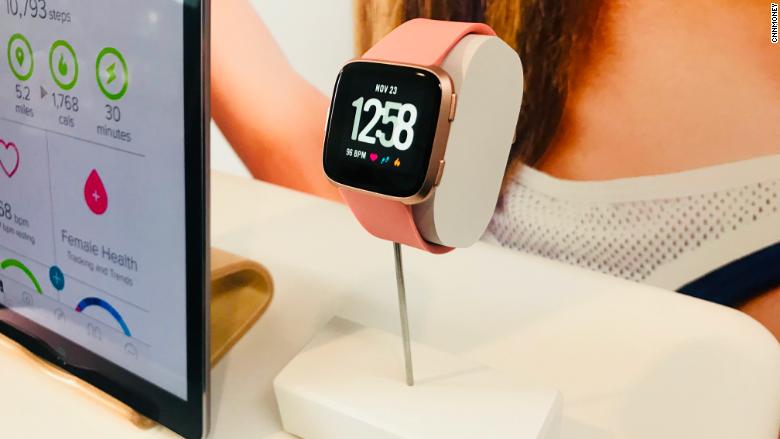Fitbit's latest trackers intend to lure more casual fitness fans, and even kids.
The company announced two new products on Tuesday: Fitbit Versa, a smartwatch that is strikingly similar to the Apple Watch, and its first fitness tracker for kids, Fitbit Ace.
At first glance, the new Versa's square display and sleek aesthetic a dead ringer for the Apple Watch. But Fitbit hopes its focus on health and fitness -- and its lower price point -- will be key differentiators.
Meanwhile, the new Fitbit Ace tracker ($100), designed for kids ages 8 and older, is an interesting move for the company. Rather than playing catch up to category leaders like Apple, Fitbit intends to get ahead of the curve by marketing a tracker specifically toward kids.
The Ace, which is nearly identical to its existing Alta tracker, tracks sleep, steps and physical activity. It intends to encourage children to stay active. The battery lasts for up to 5 days.
Fitbit has put in several safe guards in place for young users. For example, if a child wants to participate in a fitness challenge with a friend or family member, that person must be approved by their parent on the accompanying app. Kids will also not be able to access certain data such as calories burned or body fat percentage information on the app.
As for the new smartwatch, the Versa comes with a heart rate monitor, steps and workout tracking, and it's waterproof so it can count your laps in the pool -- all features also offered by the Apple Watch. Although it lacks a built-in GPS and a cellular connection option, which the Apple Watch has, it boasts a battery life of up to four days (the Apple Watch lasts about 18 hours).
At $200 -- about $129 less than the latest Apple Watch -- the Fitbit Versa is a solid option for fitness enthusiasts looking to add more smarts to tracking activities.
In addition to recording daily stats, sleep cycles and specific workouts, from runs and cycling to yoga, there's also a feature on the Versa for women to log their menstrual cycle, record related symptoms such as cramps, and compare their prior cycles.
You won't, however, be able to check emails or log on to social media sites, like what the Apple Watch offers.
The Versa also has a variety of bands to choose from beyond the regular silicone option, including leather, steel links, metal mesh and woven.
Fitbit's first smartwatch, the Ionic, launched last year. It was designed specifically for runners who want a built-in GPS option. But at $300, it was nearly the price of an Apple Watch with fewer capabilities. The gadget received mixed reviews.
But CEO and cofounder James Park is optimistic the cheaper and more stylish Versa will have larger appeal for fitness enthusiasts.
"We launched Fitbit Ionic, our first entry, which allows us to participate in this fast-growing segment," Park said at a media event in New York City. "There is a significant opportunity for us to gain more [market] share to launch more mass appeal devices in the category."
In March, the Apple Watch became the leader of the wearables market, according to a report from IDC. Apple (AAPL) shipped 8 million wearable devices during the fourth quarter, while Fitbit fell behind to second, shipping 5.4 million units during the same time period.
Although it's uncertain if its new products will help Fitbit regain momentum, the Ace tracker could pioneer a new category.
"If you look at the data, over the age of 9 is where we start to see trends in activity start to go down for kids. That's a problem we want to take on," said Melanie Chase, VP of product marketing at Fitbit.
Some schools have already been using regular Fitbits. For example, Joliet Township High School, which is south of Chicago, has given students Fitbits for the school year as part of a broader physical education program.
Researchers from Johns Hopkins and University of California, Irvine have also studied using Fitbits in schools.
But critics have expressed concern about introducing fitness trackers to kids at such a young age. Last year, a UK high school banned fitness trackers and devices that access social media platforms due to worries about negative effects on young people, according to the BBC.
Fitbit isn't the only tech company eyeing a younger audience. Last year, Facebook introduced Messenger Kids, a standalone app for kids ages six to 12.
Read also:Flying taxi takes to the skies in New Zealand
Fitbit Ace will launch in the second quarter of this year, and the Versa hits stores in April. Both products will be available for pre-orders starting Tuesday.
Source:money.cnn.com





